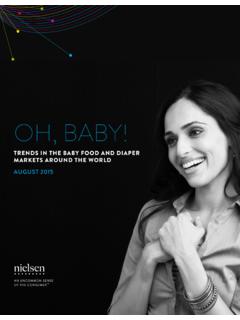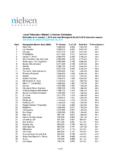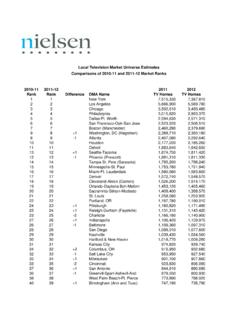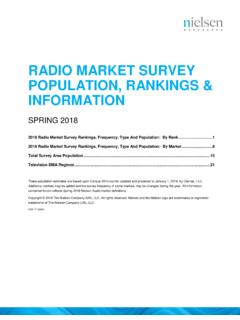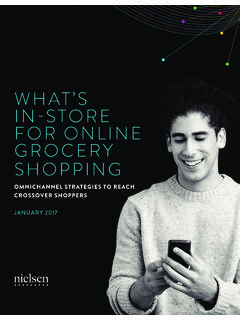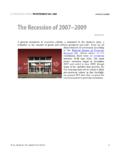Transcription of THE RISE AND RISE AGAIN OF PRIVATE LABEL - Nielsen
1 THE RISE AND RISE AGAIN OF PRIVATE LABEL Copyright 2018 The Nielsen Company (US), LLC. Confidential and proprietary. Do not Copyright 2018 The Nielsen Company (US), LLC. Confidential and proprietary. Do not in the trade structure, however, is only the tip of this iceberg. Consumers today are connected at all times and have access to endless information. As a result, their expectations are changing and they re shopping differently. Many now see PRIVATE - LABEL brands as being There is a new retail revolution underway, and it s going to affect the food industry across the globe over the next five years in ways we have never seen before.
2 We re talking about the development of PRIVATE - LABEL products and the new challenges that this will present for brands and manufacturers across the globe, as retailers develop and market their own products rather multinational name brands to meet changing consumer needs. Nielsen information across more than 60 countries shows that PRIVATE - LABEL products continue to gain share across all major geographies. The relentless store expansion by retailers over the past decade has given shoppers more access to PRIVATE LABEL and to brands.
3 In recent years, e-commerce has given brands another way to reach the consumer. However, PRIVATE - LABEL growth is also being driven by the wider choice that the digital economy offers to consumers and the globalization of shopping trends (media, technology, e-commerce). This growth is also accelerating wherever disruption is present in the trade structure. For example, we see this with the market share growth of discounters in the developed markets of Western Europe. EU Europe; NA North America; LATAM Latin America; APAC Asia-PacificSource: Nielsen Retail Measurement 20152016 global PRIVATE LABELV alue Share Growth 2015-20163 Copyright 2018 The Nielsen Company (US), LLC.
4 Confidential and proprietary. Do not to or substitutable for multinational brands. When consumers consider quality, many view PRIVATE - LABEL products as good and getting better. For example, we see this with the extensions into premium PRIVATE - LABEL products, where quality is very good. Examples include wine, specialty groceries, coffee, and prepared/ready-to-cook chilled meals of restaurant the , natural and organic products, including those without certain undesirable (1) ingredients or those that meet certain criteria (non-GMO, sustainable), present a huge opportunity for developing value-added innovations (source: Nielsen Product insider, total ).
5 While the largest brands have struggled to find growth with conventional products, a world of new opportunities exists for manufacturers of all sizes by catering to consumers desire for organic and sustainable goods (source: Nielsen Product Insider, total ).And at the opposite end of the spectrum, in the case of discounter PRIVATE - LABEL , the prices are significantly lower, yet quality is at least comparable with local brand value for money continuum from premium through to budget PRIVATE LABEL is being stretched, and retailers are innovating quickly to meet shopper expectations, which has strategic implications for the , for example, we ve seen a performance reversal among PRIVATE - LABEL and manufacturer-branded products over the past year.
6 While manufacturers of all sizes saw flat or positive performance in the fourth quarter of 2016, store-branded products took the lead a year later, growing at 2%.1 Common undesirable ingredients include BHT (Butylated Hydroxytoluene), Potassium Benzoate, High Fructose Corn Syrup, Monosodium Glutamate (MSG), Sodium Nitrate, Partially Hydrogenated Oils, Potassium Bromate, Yellow 5, etc. Conventional products include one or more of those : Nielsen Retail Measurement Services, Core syndicated hierarchy, Total , 52-week periods vs.
7 Year-ago, latest period to Sept. 30, 2017, PRIVATE - LABEL PERFORMANCEP rivate- LABEL growth trajectory rises beyond all branded tiers+ + + + + Q4 2016 Q1 2017 Q2 2017 Q3 2017 $ GROWTH OF FMCG MANUFACTURERSPRIVATE LABEL TOP 20 21-100 101-200 REMAINING 4 Copyright 2018 The Nielsen Company (US), LLC. Confidential and proprietary. Do not 2% 2% GLOBALEU LATAM ASIA MIDDLE EAST &NORTH AFRICA20172018 CHANGING ECONOMIC CONDITIONS WILL HELP PRIVATE LABEL GROW According to IMF s new World Economic Outlook, global GDP growth is expected to rise from in 2016 to in 2017 and in 2018.
8 In looking through Nielsen s recent global Consumer Confidence Index reports, we see that consumer optimism is high, and positive momentum is continuing globally. In fact, confidence levels in every region except Africa/Middle East finished the year stronger than they s expected that consumers increase their PRIVATE - LABEL purchases when the economy is struggling. That s when consumers trade down, and economic recessions are a big driver of PRIVATE - LABEL growth as shoppers need to make cost savings. WORLD ECONOMIC OUTLOOK PROJECTIONS(GDP Percent Change)5 Copyright 2018 The Nielsen Company (US), LLC.
9 Confidential and proprietary. Do not an economy recovers from recession, however, changed shopper behaviour often remains, and this sentiment is favorable when it comes to continued PRIVATE - LABEL growth. When coming out of economic downturns, consumers will maintain a more cautious approach with regard to household expenses, having developed a habit of seeking and expecting value for their money. PRIVATE - LABEL is also a new opportunity in developing countries, faster-growing economies and countries recovering from economic decline or stagnation.
10 Therefore, looking ahead, PRIVATE - LABEL brands have several avenues for future growth around the globe. PRIVATE LABEL WILL CONTINUE TO GROW IN DEVELOPED MARKETS AS CONSUMERS ARE NOT REVERTING TO PREVIOUS SHOPPING BEHAVIOUR. IN EMERGING MARKETS, PRIVATE - LABEL BRANDS ARE GROWING, AND THIS WILL CONTINUE BECAUSE THEY ARE NOW PART OF THE GROWTH OF THE ECONOMY. OLIVIER DESCHAMPS - SVP RETAILER SERVICES - WESTERN EUROPE, CANADA AND PACIFIC Copyright 2018 The Nielsen Company (US), LLC. Confidential and proprietary.
